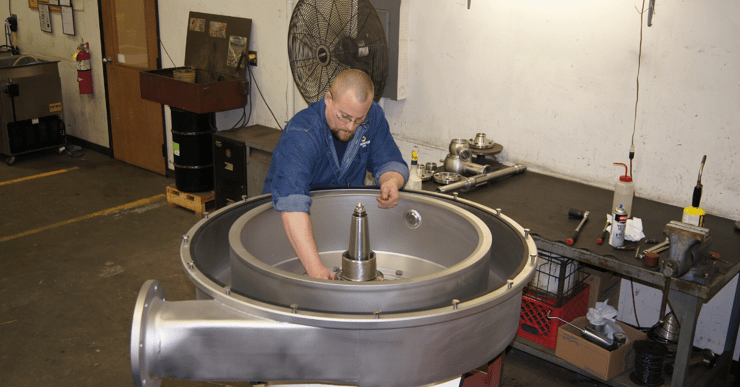Your centrifuge isn't just another piece of equipment — it's the linchpin of your facility's operations. When separation equipment falters, it sends shockwaves through your entire production process. A breakdown, whether minor or catastrophic, doesn't just affect one area—it paralyzes your whole operation.
Smart facility managers know that preventive maintenance isn't an expense, but rather an investment in your operation's reliability and financial health. Here’s how we can help you make the most of that investment to get — and keep — your centrifuge up and running without substantial downtime or unnecessary steps.
Major vs. minor centrifuge service
Centrifuge maintenance through Separators generally falls into two categories: minor service and major service. Each plays a vital role in ensuring your equipment operates at peak efficiency.
Major service
Major service, typically conducted annually, involves going through the bowl and frame, as well as conducting an overall inspection.
Bowls
When our team goes into the bowl, we replace gaskets and seals. Additionally, Separators Inc. will inspect parts and components of the bowl for wear, cracks, or abnormalities — and make the changes needed to keep your centrifuge running safely.
Frame
Next, our team will analyze the frame for two different types of machines: gear drive and belt drive. The gear drive will be inspected and replaced if need be, depending on the severity of its wear and tear. Change belts, however, are changed every time a major preventative maintenance service happens. Additionally, Separators Inc.'s technicians will change inlet and outlet o-rings and seals — again, depending on the severity.
Comprehensive component replacement
Includes replacing major worn parts like gaskets, bearings, and seals based on the specific type of drive (gear drive, flat belt drive, or integrated direct drive).
Calibration
After inspections, cleaning, and component replacements, we start the machines up for calibrating. We run water through the centrifuge to check discharge metrics and ensure everything is functioning correctly, addressing any leaks or discrepancies.
Minor service
Minor service, also referred to as top-end service, involves maintaining the top end of an industrial centrifuge.
It includes:
Full disassembly
Our technicians carefully disassemble the bowl, inspecting centripetal pumps and the disk stack.
Regasketing
As the bowl is inspected, we also look at the pistons and other wear parts for degradation, and we go through the whole machine to look for pittings and signs of corrosion from CIP (clean in place) chemicals. After inspections, the bowl is regasketed with new gaskets to ensure proper sealing.
CIP checks
We evaluate the effectiveness of Clean-In-Place (CIP) procedures. If necessary, we advise customers to adjust their cleaning cycles to improve effectiveness.
While the general recommendation is to perform minor services every six months, the actual frequency may vary based on production hours — facilities running 24/7 will likely require more frequent attention.
These areas of preventative maintenance are crucial to avoiding catastrophic events — and nobody wants to deal with that. But in the case of a disaster, you'll want some assistance.
Emergency centrifuge services

In addition to routine maintenance, Separators offers emergency service for unpredictable breakdowns and centrifuge repairs. Our rapid response team is dedicated to minimizing downtime, ensuring you receive prompt assistance. If your centrifuge requires field service, our dedicated technicians will fly out to you as soon as they can. Sometimes, that means getting to you as soon as the next day.
Field services
Outside of our preventative maintenance and emergency services, we also offer:
- Installation and start-up support
- Direct drive conversions
- Automation support
- Operator training
Shop services
Our facility located in Indianapolis contains all of the mechanical, machining, welding, balancing, bead blasting, and painting capabilities to meet the needs of our customers. And often, we can expedite emergency repairs.
When you send your equipment to our shop, we can provide you with timely estimates on:
- Bowl repairs
- Frame repairs
- Parts repairs
- Bowl balancing
- Complete remanufacturing
- Direct drive conversions
- Voith fluid clutch rebuilds
- Custom control packages
Separators also offers customers a rental bowl to use while their repairs are being completed. Our skilled centrifuge technicians will even remove your existing bowl and install the rental in a single service visit, minimizing lost production time.
Regular centrifuge repair can end up paying for itself
Partnering with an experienced service provider for major maintenance ensures that critical checks and repairs are performed correctly. We’ll help you stay on top of your services so you don’t have to give it a second thought.
We know you can stick with your OEM after your equipment’s warranty expires. But at Separators, we promise that making the switch will get you more attentive, speedy service. Plus, our employees are the best at what we do.
Separators technicians are factory-trained and able to service centrifuge equipment of all types and sizes. So, if you have different brands or types of separation equipment in your facility, you can have them maintained in a single service visit. After a service visit, we provide customers with proper documentation that they can use to maintain their records.

